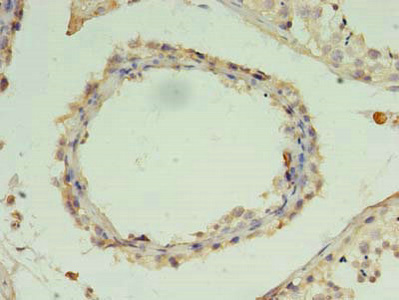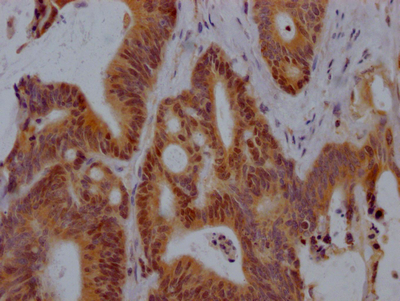ZNF397 Antibody
-
货号:CSB-PA026720LA01HU
-
规格:¥440
-
促销:
-
图片:
-
其他:
产品详情
-
产品名称:Rabbit anti-Homo sapiens (Human) ZNF397 Polyclonal antibody
-
Uniprot No.:Q8NF99
-
基因名:ZNF397
-
别名:ZNF397 antibody; ZNF47 antibody; ZSCAN15Zinc finger protein 397 antibody; Zinc finger and SCAN domain-containing protein 15 antibody; Zinc finger protein 47 antibody
-
宿主:Rabbit
-
反应种属:Human
-
免疫原:Recombinant Human Zinc finger protein 397 protein (1-275AA)
-
免疫原种属:Homo sapiens (Human)
-
标记方式:Non-conjugated
本页面中的产品,ZNF397 Antibody (CSB-PA026720LA01HU),的标记方式是Non-conjugated。对于ZNF397 Antibody,我们还提供其他标记。见下表:
-
克隆类型:Polyclonal
-
抗体亚型:IgG
-
纯化方式:Antigen Affinity Purified
-
浓度:It differs from different batches. Please contact us to confirm it.
-
保存缓冲液:Preservative: 0.03% Proclin 300
Constituents: 50% Glycerol, 0.01M PBS, PH 7.4 -
产品提供形式:Liquid
-
应用范围:ELISA, IHC
-
推荐稀释比:
Application Recommended Dilution IHC 1:20-1:200 -
Protocols:
-
储存条件:Upon receipt, store at -20°C or -80°C. Avoid repeated freeze.
-
货期:Basically, we can dispatch the products out in 1-3 working days after receiving your orders. Delivery time maybe differs from different purchasing way or location, please kindly consult your local distributors for specific delivery time.
相关产品
靶点详情
-
功能:Isoform 3 acts as a DNA-dependent transcriptional repressor.
-
基因功能参考文献:
- ZNF397, a new class of interphase to early prophase-specific, SCAN-zinc-finger, mammalian centromere protein. PMID: 18369653
-
亚细胞定位:[Isoform 1]: Nucleus.; [Isoform 3]: Nucleus. Cytoplasm.
-
蛋白家族:Krueppel C2H2-type zinc-finger protein family
-
组织特异性:Expressed strongly in testis, moderately in skeletal muscle, pancreas and prostate, and weakly in heart, placenta, liver, kidney, spleen, thymus and small intestine.
-
数据库链接:
HGNC: 18818
OMIM: 609601
KEGG: hsa:84307
STRING: 9606.ENSP00000331577
UniGene: Hs.591061
Most popular with customers
-
-
YWHAB Recombinant Monoclonal Antibody
Applications: ELISA, WB, IF, FC
Species Reactivity: Human, Mouse, Rat
-
Phospho-YAP1 (S127) Recombinant Monoclonal Antibody
Applications: ELISA, WB, IHC
Species Reactivity: Human
-
-
-
-
-






















